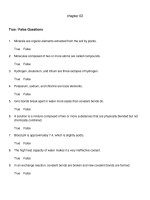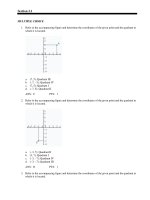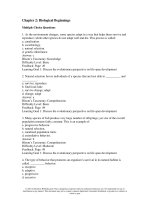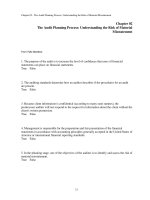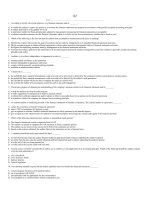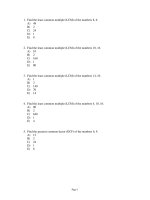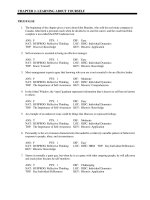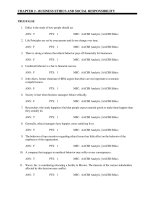The philosophical journey an interactive approach 6th edition lawhead test bank
Bạn đang xem bản rút gọn của tài liệu. Xem và tải ngay bản đầy đủ của tài liệu tại đây (51.76 KB, 17 trang )
Chapter 02 - The Search for Ultimate Reality
Chapter 02
The Search for Ultimate Reality
True / False Questions
1. Philosophical questions about the nature of reality fall under the heading of metaphysics.
TRUE
2. According to your text, a metaphysical idealist is a person who is very optimistic.
FALSE
3. Metaphysical materialism is a form of dualism.
FALSE
4. Your text said that fundamental reality is that upon which everything else depends.
TRUE
5. Hugh Elliot's story of "Tantalus" was meant to illustrate the fact that are thoughts are the
product of a nonphysical mind.
FALSE
6. Descartes's position on the mind-body issue is a form of metaphysical dualism.
TRUE
2-1
© 2014 by McGraw-Hill Education. This is proprietary material solely for authorized instructor use. Not authorized for sale or distribution in
any manner. This document may not be copied, scanned, duplicated, forwarded, distributed, or posted on a website, in whole or part
Chapter 02 - The Search for Ultimate Reality
7. René Descartes was more certain about the existence of his mind than the existence of his
body.
TRUE
8. Descartes believed that the mind and body interact in the pineal gland.
TRUE
9. David Chalmers argued that physicalism is false.
TRUE
10. According to your text, the principle of Ockham's razor lends support to the dualist.
FALSE
11. In Jeffrey Olen's story about the watch, the people who thought a gremlin caused the
watch to move represent mind-body interactionists.
TRUE
12. Identity theory claims that the mind is identical to a nonphysical substance that is separate
from the brain.
FALSE
13. The functionalist denies that mental states are necessarily identical to brain states.
TRUE
14. The functionalist denies that mental states can function as the causes of behavior.
FALSE
2-2
© 2014 by McGraw-Hill Education. This is proprietary material solely for authorized instructor use. Not authorized for sale or distribution in
any manner. This document may not be copied, scanned, duplicated, forwarded, distributed, or posted on a website, in whole or part
Chapter 02 - The Search for Ultimate Reality
15. The position of functionalism is incompatible with the strong artificial intelligence
position.
FALSE
16. René Descartes believed that someday machines would become intelligent.
FALSE
17. Descartes argued that understanding language can be used as a criterion for identifying
genuine intelligence.
TRUE
18. The strong AI thesis claims that it is possible for a computer to have cognitive states.
TRUE
19. John Searle's Chinese room argument attempted to refute physicalism.
FALSE
20. Searle maintained that there is a difference between simulating cognition and duplicating
it.
TRUE
21. The libertarian rejects the thesis of universal causation.
TRUE
22. The hard determinist and the libertarian both agree that if our choices are inevitable, then
there is no moral responsibility.
TRUE
2-3
© 2014 by McGraw-Hill Education. This is proprietary material solely for authorized instructor use. Not authorized for sale or distribution in
any manner. This document may not be copied, scanned, duplicated, forwarded, distributed, or posted on a website, in whole or part
Chapter 02 - The Search for Ultimate Reality
23. The hard determinists are claiming that only their behavior is determined, but they are
making no claims about your behavior.
FALSE
24. The compatibilist claims that we are not 100% determined in our behavior.
FALSE
25. The compatibilist claims that your desires, values, and motives play no role in explaining
your behavior.
FALSE
26. The compatibilist differs with the hard determinist over whether or not any of our actions
can meaningfully be said to be free.
TRUE
27. The libertarian would agree with the compatibilist on the definition of "free actions."
FALSE
28. Some determinists believe that it is God who determines all events.
TRUE
29. All determinists believe that everything that happens in the world is the result of a
benevolent, purposeful plan.
FALSE
30. The determinist believes that your actions would be perfectly predictable if one knew all
the causes acting upon you.
TRUE
2-4
© 2014 by McGraw-Hill Education. This is proprietary material solely for authorized instructor use. Not authorized for sale or distribution in
any manner. This document may not be copied, scanned, duplicated, forwarded, distributed, or posted on a website, in whole or part
Chapter 02 - The Search for Ultimate Reality
31. According to agency theory, event-causation describes events that are determined.
TRUE
32. Richard Taylor's agency theory is a form of libertarianism.
TRUE
33. To be a libertarian, one must deny that human actions are ever the result of previous
causes.
FALSE
34. Jean-Paul Sartre claims that the emotions we express are the result of our free choices.
TRUE
35. According to Sartre, "transcendence" refers to the fact that our lives are defined by the
possibilities we face and the choices we make.
TRUE
36. The compatibilist claims that a voluntary action is one which lacks determining causes.
FALSE
37. According to the compatibilist, we cannot be morally responsible for actions which are
determined.
FALSE
2-5
© 2014 by McGraw-Hill Education. This is proprietary material solely for authorized instructor use. Not authorized for sale or distribution in
any manner. This document may not be copied, scanned, duplicated, forwarded, distributed, or posted on a website, in whole or part
Chapter 02 - The Search for Ultimate Reality
Multiple Choice Questions
38. Which of the following metaphysical issues was/were addressed by the ancient Greek
philosophers?
A. the problem of permanence and change
B. the problem of appearance and reality
C. the nature of the self
D. all of the above.
39. The two kinds of monism are
A. atheism and theism.
B. materialism and idealism.
C. empiricism and rationalism.
D. freedom and determinism.
40. The principle of Ockham's razor says that we should
A. eliminate unnecessary entities in our theories.
B. shave off all beliefs that will not lead to the improvement of our soul.
C. make our definitions as sharp and precise as possible.
D. divide mental events and physical events into two separate categories.
41. The area of metaphysics that asks the question "What is most fundamentally real?" is
called
A. epistemology.
B. metaphysical realism.
C. ontology.
D. philosophy of science.
2-6
© 2014 by McGraw-Hill Education. This is proprietary material solely for authorized instructor use. Not authorized for sale or distribution in
any manner. This document may not be copied, scanned, duplicated, forwarded, distributed, or posted on a website, in whole or part
Chapter 02 - The Search for Ultimate Reality
42. René Descartes's version of dualism is known as
A. eliminativism.
B. physicalism.
C. interactionism.
D. idealism.
43. Which of the following were arguments which Descartes used to support his dualism?
A. I can doubt my body, but not my mind.
B. The mind is conscious, but physical things cannot be conscious.
C. One part of reality is made up of physical substances; the other part is spiritual substances.
D. all of the above
44. According to your text, Descartes's compromise was an attempt to reconcile
A. the scientific and religious views of the world.
B. the Roman Catholic and the Protestant churches.
C. Platonic and Christian views of the soul.
D. rationalism and empiricism.
45. According to David Chalmers, consciousness
A. cannot be reduced to or explained in terms of physical processes.
B. is not a fundamental feature of reality.
C. and subjective experiences do not exist.
D. can be identified with and reduced to physical processes in the brain.
46. The significance of the account about Phineas Gage was that
A. he had extra-sensory perception that could not be explained by science.
B. changes in his body produced no changes in his mental life.
C. his mind was able to overcome the limitations of his body.
D. damage to his brain caused a change to his personality.
2-7
© 2014 by McGraw-Hill Education. This is proprietary material solely for authorized instructor use. Not authorized for sale or distribution in
any manner. This document may not be copied, scanned, duplicated, forwarded, distributed, or posted on a website, in whole or part
Chapter 02 - The Search for Ultimate Reality
47. R. Buckminster Fuller's answer to the question "What's a man?" illustrates the position of
A. physicalism.
B. dualism.
C. idealism.
D. interactionism.
48. Which of the following is a criticism the physicalist makes of dualism?
A. The dualist cannot adequately explain where mind-body interaction takes place.
B. The dualist cannot explain how mind-body interaction takes place.
C. Dualism violates the principle of the conservation of energy.
D. all of the above
49. Which one of the following is a version of physicalism?
A. dualism
B. interactionism
C. identity theory
D. idealism
50. The position that claims that the terms "beliefs," "thoughts," and "desires" refer to nothing
at all is called
A. identity theory.
B. eliminativism.
C. dualism.
D. idealism.
51. According to Jeffrey Olen's essay, the identity theorist claims that pain is
A. identical to a particular kind of brain event.
B. identical to a kind of nonphysical object.
C. identical to a kind of nonphysical event.
D. a mysterious phenomenon which cannot be explained by any of the philosophies of mind.
2-8
© 2014 by McGraw-Hill Education. This is proprietary material solely for authorized instructor use. Not authorized for sale or distribution in
any manner. This document may not be copied, scanned, duplicated, forwarded, distributed, or posted on a website, in whole or part
Chapter 02 - The Search for Ultimate Reality
52. The term "folk psychology" is used by the physicalist to
A. ridicule the attempt to explain human experience in terms of beliefs, desires, and fears.
B. refer to the science of reducing mental events to brain events.
C. describe the legitimate science of explaining the growth and functioning of social groups.
D. refer to that part of human psychology that is independent of the brain.
53. "Multiple realizability" refers to
A. people who have many different personalities.
B. the claim that there are many different kinds of realities.
C. the claim that there are multiple and equally correct views of reality.
D. the fact that the same pattern can be embodied in different physical media.
54. In your text, the position defended by Jerry Fodor was
A. identity theory.
B. eliminativism.
C. functionalism.
D. dualism.
55. Which of the following statements would a functionalist affirm?
A. A computer could never have mental states, because it lacks an immaterial mind.
B. To have mental states like ours, it is necessary to have a brain like ours.
C. We will never be able to eliminate mentalistic concepts from our psychological theories.
D. all of the above
56. Which of the following statements would a functionalist affirm?
A. Mental states are defined in terms of the causal role they play.
B. Mental states are not defined in terms of the underlying substance in which they are found.
C. Mental states can cause both other mental states and bodily states.
D. all of the above
2-9
© 2014 by McGraw-Hill Education. This is proprietary material solely for authorized instructor use. Not authorized for sale or distribution in
any manner. This document may not be copied, scanned, duplicated, forwarded, distributed, or posted on a website, in whole or part
Chapter 02 - The Search for Ultimate Reality
57. The Turing Test is an attempt to determine
A. the level of intelligence of an average human being.
B. whether or not a computer has achieved intelligence.
C. whether or not a particular mental state is produced by a particular brain state.
D. when it is ethical to use computers to make important decisions.
58. Marvin Minsky defended the position represented by
A. the strong AI thesis.
B. Cartesian dualism.
C. John Searle's Chinese room argument.
D. Edgar Allen Poe's attack on machine intelligence.
59. John Searle's Chinese room argument attempts to show that
A. computers are capable of translating foreign languages into English.
B. computers will never be able to simulate conversations.
C. it is likely that computers will some day be as intelligent as humans.
D. passing the Turing Test is not a sufficient criterion for intelligence.
60. The text referred to the type of freedom we have when our actions are not limited by
external forces or obstacles as
A. circumstantial freedom.
B. metaphysical freedom.
C. existential freedom.
D. moral freedom.
61. The position that claims we have metaphysical freedom is
A. hard determinism.
B. compatibilism.
C. incompatibilism.
D. libertarianism.
2-10
© 2014 by McGraw-Hill Education. This is proprietary material solely for authorized instructor use. Not authorized for sale or distribution in
any manner. This document may not be copied, scanned, duplicated, forwarded, distributed, or posted on a website, in whole or part
Chapter 02 - The Search for Ultimate Reality
62. The hard determinist and the libertarian both believe that
A. compatibilism is true.
B. incompatibilism is true.
C. universal causation is true.
D. we have moral responsibility.
63. The libertarian and the compatibilist both believe that
A. universal causation is true.
B. we have metaphysical freedom.
C. we have moral responsibility.
D. we can be determined and free.
64. By definition, the compatibilist believes that _________ and __________ are compatible.
A. science/religion
B. universal causation/metaphysical freedom
C. hard determinism/moral responsibility
D. determinism/free will
65. Which of the following is a criticism the hard determinist would make of the libertarian?
A. The libertarian believes in the absurd position of incompatibilism.
B. Libertarianism is in conflict with the scientific view of the world.
C. The libertarian believes in the problematic universal causation thesis.
D. all of the above
66. The determinist says that the activity of deliberation occurs when
A. our will is suspended between two causes that pull us in opposite directions.
B. our behavior is free from any determining causes at all.
C. we are determined to act in one way, but the will freely struggles to act in another way.
D. we are determined to act in one way, but our reason struggles to overcome the causes
acting on us.
2-11
© 2014 by McGraw-Hill Education. This is proprietary material solely for authorized instructor use. Not authorized for sale or distribution in
any manner. This document may not be copied, scanned, duplicated, forwarded, distributed, or posted on a website, in whole or part
Chapter 02 - The Search for Ultimate Reality
67. Concerning the behavior of the criminal, the hard determinist would say
A. the criminal behavior was the inevitable result of previous causes.
B. the criminal cannot be held morally responsible for his or her behavior.
C. the criminal should receive psychological treatment, not punishment.
D. all of the above
68. Benedict Spinoza is an example of which of the following positions?
A. determinism
B. dualism
C. agency theory
D. libertarianism
69. According to your text, one of the three arguments used to support libertarianism is the
argument from
A. the necessity of universal causation.
B. religious experience.
C. the compatibility of freedom and determinism.
D. deliberation.
70. According to agency theory, the two kinds of causes are
A. scientific causes and divine causes.
B. deterministic causes and random, indeterministic causes.
C. event-causation and agent-causation.
D. deterministic physical causes and deterministic psychological causes.
71. Jean-Paul Sartre refers to those events in our past that we cannot change as our
A. facticity.
B. transcendence.
C. determining causes.
D. behavioral antecedents.
2-12
© 2014 by McGraw-Hill Education. This is proprietary material solely for authorized instructor use. Not authorized for sale or distribution in
any manner. This document may not be copied, scanned, duplicated, forwarded, distributed, or posted on a website, in whole or part
Chapter 02 - The Search for Ultimate Reality
72. According to Sartre, what is the significance of the fact that you were born a certain
gender?
A. You are determined to act and think a certain way because of biological causes.
B. You are conditioned to act and think a certain way by society.
C. This fact has no significance until you assign meaning to it.
D. One's gender has no significance because there is one basic, human nature that governs us
all.
73. Sartre uses the term "bad faith" to refer to
A. a lack of religious belief.
B. our attempt to deny our freedom and responsibility for who we are.
C. the circumstances of our lives that govern how we act.
D. our failure to accept what is inevitable and meant to be.
74. The compatibilist claims that a free action is an action which
A. is impossible.
B. lacks both a physical and a psychological cause.
C. requires one to have metaphysical freedom.
D. has, as its immediate causes, psychological states in the agent.
75. A compatibilist would claim that if a formerly upright citizen chooses to become a
criminal, this shows that
A. people sometimes make free choices that are not determined by their personality.
B. persons can never be held morally responsible for their actions.
C. internal and external causes acted to determine the person's behavior differently than it was
determined previously.
D. human behavior is too complex to know if we are free or determined.
2-13
© 2014 by McGraw-Hill Education. This is proprietary material solely for authorized instructor use. Not authorized for sale or distribution in
any manner. This document may not be copied, scanned, duplicated, forwarded, distributed, or posted on a website, in whole or part
Chapter 02 - The Search for Ultimate Reality
76. In comparing (1) Gandhi fasting because he wanted to free India and (2) a man starving in
the desert, Walter Stace says
A. in both cases the action was caused and, hence, not free.
B. in (1) his action was uncaused and free and in (2) it was caused and not free.
C. in (1) his action was caused and free and in (2) it was caused and not free.
D. in (1) his action was uncaused and not free and in (2) it was caused and not free.
Essay Questions
77. Set out, in a series of steps, one of Descartes's arguments for mind-body dualism. Which
premise do you think is the weakest? Why? What are some other ways the argument could be
criticized?
Answer will vary
78. Discuss two of the reasons why the physicalists think that dualism is implausible.
Answer will vary
79. What are the similarities between identity theory and eliminativism? How do they differ?
Answer will vary
80. What happened to Phineas Gage that is relevant to the mind-body issue? Which position
could use this account as ammunition? How so?
Answer will vary
2-14
© 2014 by McGraw-Hill Education. This is proprietary material solely for authorized instructor use. Not authorized for sale or distribution in
any manner. This document may not be copied, scanned, duplicated, forwarded, distributed, or posted on a website, in whole or part
Chapter 02 - The Search for Ultimate Reality
81. What does "multiple realizability" mean? What role does this notion play in the theory of
functionalism?
Answer will vary
82. How does functionalism provide theoretical support for the claims of many artificial
intelligence researchers that computers can think?
Answer will vary
83. What is the Turing Test? What does it try to accomplish?
Answer will vary
84. What is the strong AI thesis? How does it differ from the weak AI thesis? What was
Descartes's view of the strong AI thesis? What was his argument for this view? What is
Marvin Minsky's evaluation of the strong AI thesis?
Answer will vary
85. What is John Searle's Chinese room thought experiment? What does he think it
demonstrates?
Answer will vary
86. What are the similarities and differences between libertarianism and hard determinism?
What are the similarities and differences between hard determinism and compatibilism?
Answer will vary
2-15
© 2014 by McGraw-Hill Education. This is proprietary material solely for authorized instructor use. Not authorized for sale or distribution in
any manner. This document may not be copied, scanned, duplicated, forwarded, distributed, or posted on a website, in whole or part
Chapter 02 - The Search for Ultimate Reality
87. What do you think is the strongest argument for determinism? What do you think is the
strongest argument against determinism? Which of these two arguments is the better one?
Why?
Answer will vary
88. What do you think is the strongest argument for libertarianism? What do you think is the
strongest argument against libertarianism? Which of these two arguments is the better one?
Why?
Answer will vary
89. How would the determinist reply to each of the following criticisms? (a) "When I make a
choice, I could have chosen differently." (b) "The fact that I have to deliberate before making
a decision proves that I am not determined." (c) "It is impossible to predict another person's
behavior."
Answer will vary
90. Discuss Clarence Darrow's defense of Leopold and Loeb. How does his argument indicate
that he is not a libertarian? How does his argument indicate that he is not a compatibilist?
Answer will vary
91. What is agency theory? How does it attempt to solve the problem of freedom and
determinism?
Answer will vary
2-16
© 2014 by McGraw-Hill Education. This is proprietary material solely for authorized instructor use. Not authorized for sale or distribution in
any manner. This document may not be copied, scanned, duplicated, forwarded, distributed, or posted on a website, in whole or part
Chapter 02 - The Search for Ultimate Reality
92. What does Jean-Paul Sartre mean when he says "existence precedes essence"? Using his
notions of "facticity" and "transcendence," explain why he thinks you are not determined even
by facts over which you had no control (such as your gender).
Answer will vary
93. Discuss why compatibilists think that determinism and freedom are compatible. Explain
how a libertarian would critique the compatibilist's notion of "free action."
Answer will vary
2-17
© 2014 by McGraw-Hill Education. This is proprietary material solely for authorized instructor use. Not authorized for sale or distribution in
any manner. This document may not be copied, scanned, duplicated, forwarded, distributed, or posted on a website, in whole or part

